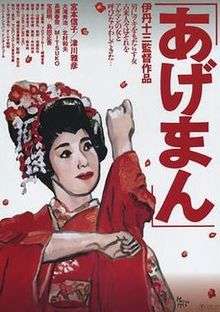A-Ge-Man: Tales of a Golden Geisha
A-Ge-Man: Tales of a Golden Geisha (あげまん, Ageman) is a 1990 Japanese comedy film directed and written by Juzo Itami.[1] It stars Nobuko Miyamoto as a geisha who brings good luck to her intimate companions and Masahiko Tsugawa as her unfaithful, sometimes partner.
| A-Ge-Man: Tales of a Golden Geisha | |
|---|---|
 | |
| Directed by | Juzo Itami |
| Produced by |
|
| Screenplay by | Juzo Itami[1] |
| Starring |
|
| Music by | Toshiyuki Honda[1] |
| Cinematography | Yoshihiro Yamazaki[1] |
Production companies |
|
| Distributed by | Toho |
Release date |
|
Running time | 119 minutes[1] |
| Country | Japan |
Cast
- Nobuko Miyamoto as Nayoko
- Masahiko Tsugawa as Mondo Suzuki
- Ryunosuke Kaneda as Tamonin
- Atsuko Ichinomiya as Rin, Tamonin's mother
- Kin Sugai as Foster mother
- Kazuyo Mita as Hiyoko
- Mitsuko Ishii as Eiko
- Yoriko Douguchi as Junko
- Maiko Minami as Sayori-chan
- Fukumi Kuroda as Kiyoka
- Isao Hashizume
- Haruna Takase as Fur shop manager
- Tokuko Sugiyama as Restaurant manager
- Yakan Yanagi as Foster father
- Michiyo Yokoyama as Tamonin's court lady
- Hiroko Seki as Shinkame Chiyo restaurant manager
- Noborou Yano as Hirutaji chief
- Yan Yano as Hirutaji chief
- Harukazu Kitami as Bo-san #1
- Akira Kubo as Bo-san #2
- Yoshihiro Kato as Segawa Kikunojo
- Akari Uchida as Houte couture woman
- Mihoko Shibata as Woman carer in movie
- Mansaku Fuwa as Executioner's assistant in the dream
- Yôichi Ueda as Camera man
- Shinobu Oshizaka as Doctor
- Eijirō Tōno as Prime Minister
- Kiyokata Saruwaka as Traditional dance teacher
- Kazuo Kitamura as Tsurumaru
- Akira Takarada as Inukai
- Shōgo Shimada as Zenbu Okura
- Hideji Ōtaki as Chijiwa (uncredited)
- Hiroshi Okouchi as Chichiiwa
Release
A-Ge-Man: Tales of a Golden Geisha was distributed theatrically in Japan by Toho on 2 June 1990.[1] The film was shown at the Chicago International Film Festival on October 10, 1990 and at the Japan Today Film Festival in Los Angeles on November 1, 1991.[1]
Reception
A-Ge-Man: Tales of a Golden Geisha was nominated for four Japanese Academy Awards—Best Director (Juzo Itami), Best Actress (Nobuko Miyamoto), Best Screenplay (Juzo Itami) and Best Editing (Akira Suzuki).[2]
gollark: Just do```luafunction fs.open(file, mode) local f = {} -- Store fs files in here local handle = io.open(file, mode) function f.readAll() return handle:read("*a") end function f.close() handle:close() end function f.write(data) handle:write(data) end return fend```unless there's some other thing you need it for.
gollark: Wait, why do you need a global `openFiles` thing for that?
gollark: Cool, should be useful.
gollark: It might be redirecting and being weird.
gollark: No, I mean, try that URL.
References
Footnotes
- Galbraith IV 2008, p. 372.
- "14th Japanese Academy Awards". japan-academy-prized.jp.
Sources
- Galbraith IV, Stuart (2008). The Toho Studios Story: A History and Complete Filmography. Scarecrow Press. ISBN 1461673747. Retrieved October 29, 2013.
This article is issued from Wikipedia. The text is licensed under Creative Commons - Attribution - Sharealike. Additional terms may apply for the media files.